ARTICLE AD BOX

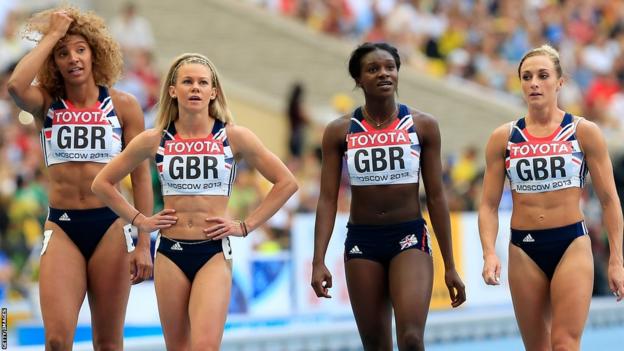 The quartet of (left to right) Ashleigh Nelson, Hayley Mills, Dina Asher-Smith and Annabelle Lewis initially believed they had finished fourth, before a successful appeal against the second-placed French team put them on the podium
The quartet of (left to right) Ashleigh Nelson, Hayley Mills, Dina Asher-Smith and Annabelle Lewis initially believed they had finished fourth, before a successful appeal against the second-placed French team put them on the podiumSign up for notifications to the latest Insight features via the BBC Sport app and find the most recent in the series.
Never one to mince his words, Charles van Commenee - then UK Athletics head coach - let rip in the straight-talking manner so characteristic of his tenure.
"This was an accident waiting to happen," said the Dutchman in June 2012.
"I'm not really surprised; it's the reason why I stopped funding the programme two years ago."
The target of his ire was the much-derided British women's 4x100m team, who had just been disqualified for a lane infringement in the 2012 European Championships heats. The misstep meant they slipped to 17th in the world rankings.
With only the top 16 awarded a place at the upcoming London Olympics, the host nation would have the ignominy of no women's sprint relay squad to cheer at their home Games.
"Obviously women's sprints, the sprints in general, and in particular the 100m, needs serious review," continued Van Commenee.
"Most of the time you have to go to the lowest point in order to create an environment to improve. Sometimes it is necessary to get to the bottom before you raise the game again."

A year later, with Van Commenee gone - having resigned after failing to hit his own medal target at those London Games - the British women's 4x100m team won a remarkable bronze at the Moscow 2013 World Championships.
Twenty-nine years since last making a global podium and with the memory of that humiliating Olympic absence still fresh, they were suddenly one of the world's quickest teams. The result was also the improbable start of the most successful period in their history.
So routine have medals become over the past decade that Britain's fastest women not making a global podium is now deemed failure.
Through Dina Asher-Smith, the country has found its headline star, claiming Britain's first individual global sprint medal for 36 years at Doha 2019. She now has eight Olympic and world medals during her career.
So what has changed?
As Britain's female sprinters set their sights on more podiums at this month's Budapest World Championships, how did they go from figures of ridicule to medal favourites?
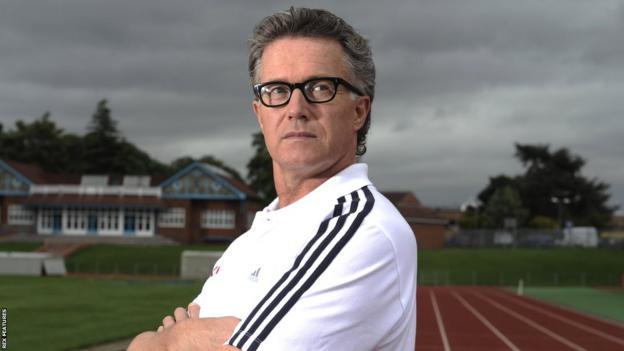 Van Commenee was the straight-talking head coach appointed to lead Great Britain's athletes into the London 2012 Olympics
Van Commenee was the straight-talking head coach appointed to lead Great Britain's athletes into the London 2012 OlympicsBefore the glory came the shame.
Never known as a women's sprinting powerhouse, Britain has instead enjoyed flickers of prosperity over the years: two individual silvers from Dorothy Manley and Audrey Williamson at the 1948 Olympics, Dorothy Hyman's brilliant 100m and 200m double at the 1960 Olympics, and a brief period of four British Olympic and world medals in the early 1980s.
But by the time London 2012 came around, those days were distant memories.
A failure to win any sort of global women's sprint medal - relay or individual - for decades had prompted Van Commenee to take drastic action two years earlier.
Furious at watching Britain's 4x100m women crash out in the first round of the 2010 European Championships, the head coach had eviscerated the team in the lobby of the team's Barcelona hotel, within earshot of a nearby group of journalists interviewing Jessica Ennis-Hill.
"The women - those changeovers were diabolical," he later told the media. "It's unacceptable - schoolgirls' mistakes. It will have consequences."
Sure enough, he swiftly removed funding for the women's relay programme, casting them aside.
It was a controversial decision.
Two years later, after Hayley Mills' lane infringement in Helsinki cost Britain their home Olympics place, she hit out at Van Commenee and UK Athletics for not giving the team sufficient race opportunities during the preceding qualification period.
"Qualification should have been done and dusted way before this weekend," Mills said after that fateful race. "I know today was my fault but not going to the Olympics is the result of people not doing their jobs.
"I will take all the blame in the world for us not reaching the European final, but I won't take any for two years of missed opportunities."
In truth, with the hierarchy refusing to believe in the athletes, the athletes had stopped believing in themselves.
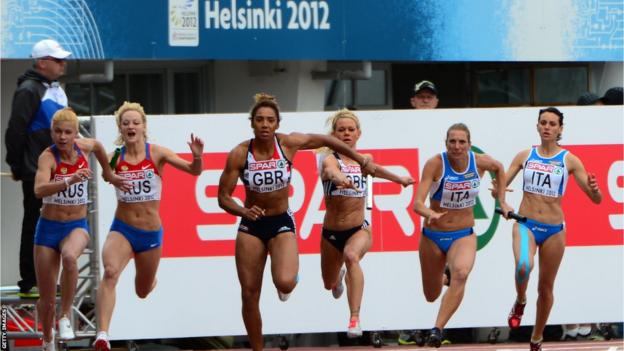 Great Britain's Ashleigh Nelson and Hayley Mills (centre, left and right) were part of the team that failed to make it out of the heats at the 2012 European Championships, consequently missing out on London 2012
Great Britain's Ashleigh Nelson and Hayley Mills (centre, left and right) were part of the team that failed to make it out of the heats at the 2012 European Championships, consequently missing out on London 2012Upon taking charge of Britain's sprints and relay setup in early 2013, American coach Rana Reider was shocked by the lack of enthusiasm among some of the country's best female sprinters.
"We had a relay meeting in Loughborough with all the ladies," he said that year. "We invited some 40 people but only 20 showed up. It surprised me a lot."
Annabelle Lewis, who would form part of the 2013 World Championships bronze medal-winning relay team, remembers the discord among the squad at that time.
"Before I joined the squad, I perceived a mentality of people just choosing what they wanted to do within the relay and when they wanted to do it," she said.
"When Rana took over, he created a mentality where it was a privilege to be part of the relay team and you had to act accordingly.
"He created weekends where everyone came together as part of the relay and everyone had to prove themselves to be part of the team."
Fellow 2013 relay bronze medallist Ashleigh Nelson says the newly created sense of unity was crucial.
"When we didn't qualify for the Olympics it was heartbreaking," she said.
"When Rana Reider came in, he just said if you don't show up to relay practice, no matter how fast you are, you won't get in the team. That changed everyone's attitude.
"The previous year, when Charles van Commenee was the head, he was so uncomplimentary about the women's sprints, especially the relay.
"After that, I think the feeling was that we just wanted to go out, run well and not be slated. We wanted to show that we deserved a chance to run without someone telling us we weren't good enough."
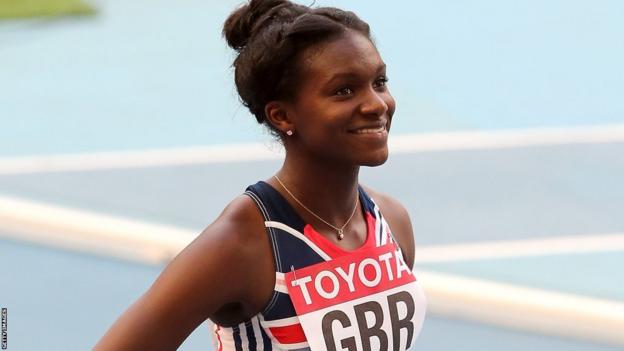 Asher-Smith had won gold in the 200m and 4x100m relay at the European Junior Championships three weeks before the start of Moscow 2013
Asher-Smith had won gold in the 200m and 4x100m relay at the European Junior Championships three weeks before the start of Moscow 2013Understandably, given the turmoil of the preceding years, expectation was not particularly high for the hotchpotch group of Britain's unfunded female sprinters at the 2013 World Championships in Moscow.
Asher-Smith, then only 17, had been thrust into the British relay set-up just weeks after winning two gold medals at the European Junior Championships. Lewis had only just broken through to the international ranks after going below 11.50 seconds over 100m for the first time that summer.
With Anyika Onuora's withdrawal after picking up an injury while competing individually in Moscow, Nelson was the sole member of the remaining quartet with senior international experience of note.
Squad member Mills was drafted into the team to replace Onuora.
"When Anyika got injured it was like: 'What the hell do we do now?' said Lewis. "Dina was very young at the time. We were all fairly amateur, but we were confident in how we could work together.
"I think when you are young and inexperienced in this championship set-up, it made us just go out there and see what we could do rather than having any expectations."
Having qualified sixth fastest from the heats, Britain unexpectedly found themselves in silver-medal position at the last changeover in the final, only for Mills to be passed by the American and French anchor-leg runners with the finish line approaching.
They would have to be content with fourth.
Any sense of disappointment at such a narrow podium miss swiftly dissolved in the context of what had come before. "I couldn't believe we actually managed to get that place with such a young, inexperienced team," said Lewis.
Yet there was more unexpected drama to come. After the medal ceremony had taken place, British team staff filed a protest against silver-medal winners France. More than two hours after the race, the French team were then disqualified for handing over the baton outside the permitted zone.
Despite a counter-appeal and the French athletics federation president describing the disqualification as "an outrage", the decision remained and Britain were upgraded to the most unlikely of bronze medals.
"We were already back in our weird, massive hotel," said Nelson. "It was late in the evening when Rana came and told us. He was a joker so we thought he was just joking. Obviously when we realised he wasn't, we were ecstatic.
"The only disappointing thing is that we didn't get to go on the podium. We didn't get our medals until the following year at the Indoor Grand Prix in Birmingham [in February 2014]."
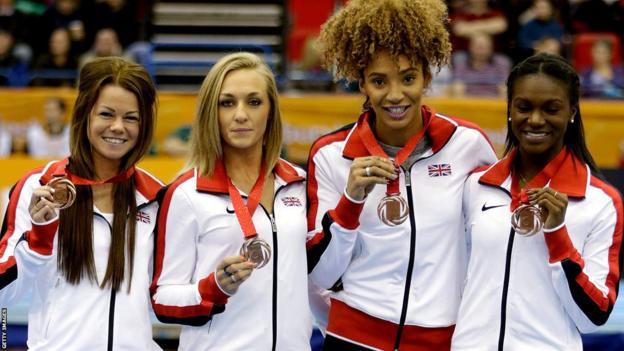 Mills, Lewis, Nelson and Asher-Smith belatedly receive their medals at the Birmingham indoor event in February 2014
Mills, Lewis, Nelson and Asher-Smith belatedly receive their medals at the Birmingham indoor event in February 2014Their bronze was sufficient for the new UK Athletics hierarchy to change tack and restore women's 4x100m funding for the following year. It also sparked a notable upturn in fortunes.
Despite the departure of Reider - currently serving a one-year probation after misconduct allegations - from British Athletics in 2014, the team's rise continued unchecked.
Britain's female sprint relay quartets won Olympic bronze behind the mighty Americans and Jamaicans in 2016 and 2020, while they have also won two silvers from the past four World Championships, narrowly missing out on the podium on the other two occasions.
While much of the success is a result of hard work at relay camps and a renewed focus on the programme, athletes are quick to stress the importance of collective buy-in, including the impact of UK Athletics lead performance psychologist Jennifer Savage, who started working with the relay programme in 2014.
"Maybe beforehand people weren't getting on, but the current group of girls has a common goal and goes after it," said Nelson.
"It doesn't matter what you want to do in your individual event - despite everybody's individual aspirations, we also realise the benefit of coming together as a team."
Bianca Williams, an unused reserve in that Moscow 2013 relay squad, said: "There didn't used to be much belief in relays. After that Moscow medal people realised what we could do.
"The chemistry we all have is fantastic and each year it keeps improving. We have relay bonding camps where we really understand each other and what we want from the year."
Through Asher-Smith, the collective success has been replicated in the individual sprints, with Britain's fastest-ever woman collecting one 100m and two 200m world medals. But even beyond her, the strength in depth is greater than ever, with Daryll Neita leading a clutch of British contenders in her wake.
Four of the top five British women's 100m times and four of the top six 200m times have been recorded since 2016.
Beyond reaping the benefits of technological advancements on and off the track, Lewis - who is now an athletics coach - believes there has been a fundamental mindset shift since the sustained relay success.
"Once you have success in the collective it gives you confidence," she said. "It's given everyone a platform to understand how to perform under pressure around the best people in the world.
"Then it gives you more confidence to say: 'I don't just want to go for the relay, I want to go for the individual as well.'"
Nelson, who has missed the 2023 season through injury, points to the importance of Asher-Smith's joy on the global stage and the pack mentality in chasing her heels.
"In the American collegiate system, everybody is fast and they are coming up against fast people every week," she said. "Within the UK, maybe there was a lack of belief or people thought there was a ceiling because no-one from Britain had done it.
"It just took one or two people to break through for everyone to have that belief. We all want to beat each other so maybe it's having someone that bit closer to home that you can compete with."
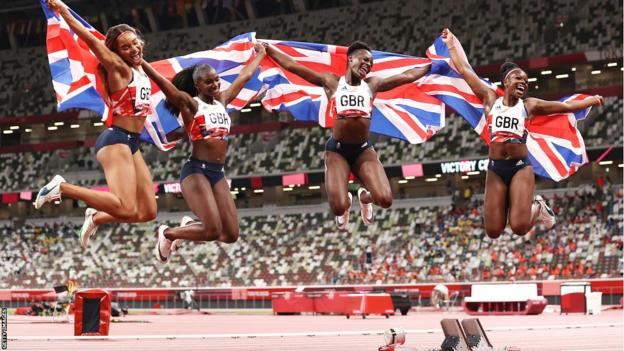 (Left to right) Imani-Lara Lansiquot, Dina Asher-Smith, Daryll Neita and Asha Philip celebrate their Olympic bronze medal in Tokyo - the latest of Great Britain's string of women's sprint relay podium appearances
(Left to right) Imani-Lara Lansiquot, Dina Asher-Smith, Daryll Neita and Asha Philip celebrate their Olympic bronze medal in Tokyo - the latest of Great Britain's string of women's sprint relay podium appearancesPerhaps it was all part of Van Commenee's masterplan.
Asked 11 years ago why he had culled the women's sprint relay funding, the Dutchman insisted it was not a punishment but that he was "always interested to see how people respond".
Whatever Van Commenee's reason, Lewis - who, like Mills, would never represent her country again after Moscow 2013 - is just thankful she was part of something that changed the course of athletics in Britain.
"Thank God we did that so UK Athletics decided to put more into the women's sprint programme," she said.
"Having people like Dina and Daryll putting their faces out there means there are more and more young athletes wanting to follow them.
"The more success they have, the more chance we have to keep the legacy going. If it was the pivotal moment 10 years ago then I'm just proud to be part of that."
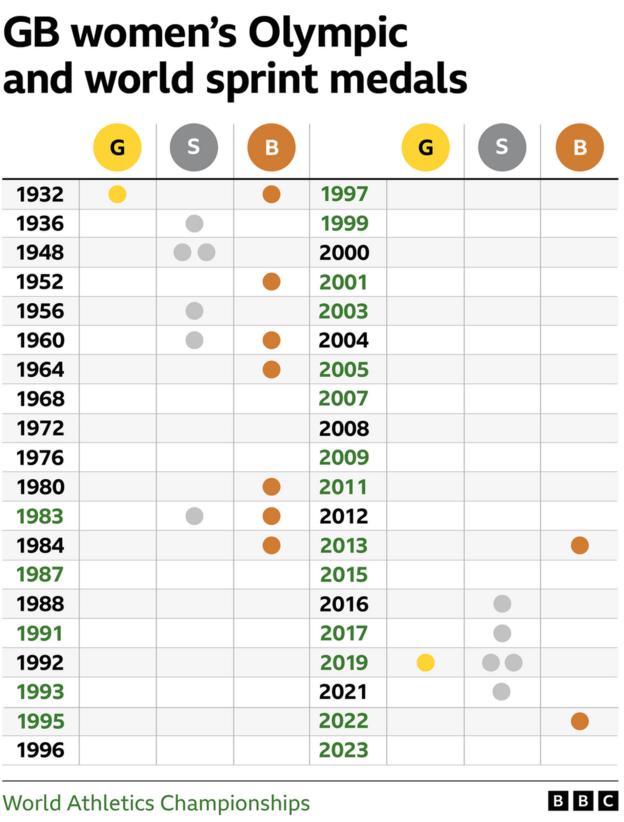

 1 year ago
66
1 year ago
66








 English (US)
English (US)